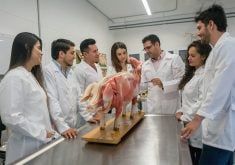Ernesto Sirolli has played a white knight to thousands of entrepreneurs around the world and the Italian born consultant was in rescue form again at the 10th anniversary conference of Women Entrepreneurs of Saskatchewan Inc.
In a day-long workshop May 13 in Saskatoon, he told women business owners that they need three skills to succeed: the ability to produce a product or service; the ability to sell it and the ability to keep their finances in order.
However, he said he has never met an entrepreneur who was equally skilled in all three areas. The answer is to hire people who have the skills you lack.
Read Also

Livestock leads Canada’s farm economic outlook
Forecasts by a major Canadian farm lender featured good and bad news on the financial health of both farmers and Canadians at large.
That message takes the pressure off, said Gloria Marsolais of Hep-burn, Sask.
She and her husband recently moved to Saskatchewan from Airdrie, Alta., and resumed their Puppet Odyssey business. They make puppets, teach puppetry workshops and write skits to present in churches and schools.
Marsolais said it was good to hear someone of Sirolli’s experience say that she doesn’t have to do everything.
“He was encouraging and practical. É Living in the country, you’re not often rubbing shoulders with businessmen.”
She said the workshop taught her that she is strong on the production side but needs more training in marketing. Having people who can assist her in other skills will allow her to “see the whole horizon.”
Sirolli has spent 30 years in Africa, Australia and North America working with people on sustainable economic development. He said his approach is to listen to people and then coach them so they see their own solutions.
He outlined a story of his work with an Australian village where the local industry had collapsed because of overfishing. He heard about the 55-year-old former manager of the fish processing factory who was on welfare and reduced to selling smoked tuna from a kiln operation in his garage. While it was a good product, he could never get enough money together to expand.
Sirolli helped him make contacts with restaurants and hotels in the capital city, a seven hour drive away. After distributing samples of the product, the orders rolled in and the business rented space in a proper commercial kitchen.
Sirolli noted that the path to business success never runs smoothly. While the fish product appeared to be on its way, Sirolli was approached by the town’s five angry fishermen. They had not been paid for their tuna for two months. Meanwhile, the tuna entrepreneur had bought himself a new car.
Sirolli was embarrassed. He took the fish entrepreneur to an accountant and heard how the man had been through a messy divorce, had had three bankruptcies and had no idea how to handle money.
Sirolli said he wouldn’t work with him any more unless the man gave his chequebook and financial authority to the accountant. That was done and the business became a success. The tuna was served at a banquet to Queen Elizabeth when she visited the country.
Sirolli also helped the five fishermen pool $1,000 to build a marketing plan. Another visit to the capital city led them to a chef in a Japanese restaurant who said their fresh tuna made great sushi, better than the frozen imported fish from Indonesia that was being used.
The fishermen hired a marketer who signed them up with a major Japanese company that bought all their catch. They were making 10 times the price that a cannery 300 kilometres away paid them.
Along the way the fishermen had to learn to handle the tuna with less bruising and to trust one of their wives, who worked in a bank, to be their accountant.
Like the fishermen, whose passion in life was to go out in their boats every day and catch fish, prairie farmers just want to haul grain to the elevator. Sirolli said farmers, like the fishermen, need to acquire skills they lack by training themselves or hiring people.
“You can never run a company alone. Whatever you hate, it will be your downfall. So network with people who are different from you. É A smart entrepreneur surrounds herself with people who are passionate about her gaps.”
Sirolli also advised farmers to group themselves into co-operatives and do more than produce a raw product. Every bit of value-adding cuts out a middleman and brings more money to the farmer. He noted that Italian farmers not only produce food but own the factories where it is processed and the grocery stores where it is sold.
Sirolli said few farmers are narrowing the gap between their food and the consumer, indicating the production side is adequate, but “there is a crisis in agricultural leadership.”














